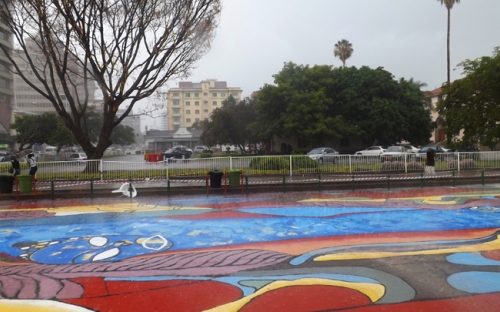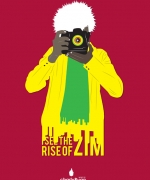Inventing the future
Imagine a country where artists have taken over - literally? Where every ministry, every business, even the army, is run by artists. What kind of a country would that be? At its very best, art is an original expression of the highest form of humanity, where one is creating for society and expressing what is personal, with a mastery that can speak across cultures and social status - akin to a metaphysical tower of Babel. At its worst, art is manipulated by interests external to the source of inspiration, shallow and poorly executed. But for the purposes of the opening question, let’s assume we are dealing with a country taken over by the former definition of art.
Good art, often entails an inevitable element of self-sacrifice, where you excavate from the innermost of you, without knowing whether the world will accept or ridicule what you create. It entails ‘unnecessary’ time and effort over and above what would be deemed adequate, and then some on top of that. What is original, is historic, it leaves a mark. When people buy quality products, what they are really buying is time – all of the extra testing, experimenting, thinking and re-thinking about the tiniest details. I believe that people can subconsciously feel the extra effort that goes into creating something, even if at first glance it’s not immediately apparent.
It is the absence of art and design that lies at the root of many of our country’s challenges. Take a walk down the aisle of any Zimbabwean supermarket, and more often than not the visually attractive products tend to be imported. Where are our Zimbabwean designed products in supermarkets abroad? Unsurprisingly, we have a lopsided economic balance of payments. Art and culture in Zimbabwe have been relegated to being a peripheral ‘sector’, a source of entertainment rather than the linchpin of all economic and development activity. There is talk of an Afrikan Renaissance, but in truth it is more a story of increased earnings from natural resources and a resultant growing consumer class.
The Medici family, which controlled Florence throughout much of the European Renaissance, played a significant part in the patronage of the arts with the likes of Da Vinci influencing everything from architecture, military tactics, medicine and science. Art was not just about the next exhibition, it underpinned one of history’s greatest developmental flowerings and made Florence one of the most beautiful cities in the world, a legacy that continues to materially benefit today’s generation centuries later. Culture is forever. Afrikan cities may be getting bigger, and in some cases richer, but they are no more glamorous and their growth is consumption and resource based with little artistic underpinning - a renaissance without art. Good Afrikan artists leave to be signed by galleries in Europe and elsewhere, how then do they play a full part in shaping their home societies profoundly in the way their erstwhile counterparts like Michelangelo did during the European Renaissance? Afrika’s rich need to come to the party and not just make money, but leave an enduring Afrikan artistic legacy that remains long after the resources are gone and consumerism here looks like that found anywhere else on the planet. The best Afrikan art and art based thinking needs to be found, shown, expressed, archived, represented and spoken for in Afrika by Afrikans.
Taking a look at the applicability of art to bread and butter issues like shelter, why do we continue to build low income housing that looks dull and utilitarian, that uses the same design, inspiration and materials from fifty years ago when its purpose was simply storage for labour? The first job of design is to make sure that a creation is fit for a purpose. As storage for labour, in a context where people are not free, the low income housing of today is gloriously adequate. But as a dwelling for a free incumbent of the great Afrikan century, such mediocrity is incongruous. Can a low cost house not be beautiful? The focus on utility and economics at the expense of artistic posterity, means we have housing for the masses that looks as though we were never here. One of the few internationally awarded buildings in Zimbabwe - the Eastgate building, drew on indigenous knowledge for its eco-friendly termite hill inspired design. Why are most of our local products bland and utilitarian when we have so many great artists and natural raw materials that are totally under utilised? Why aren’t we building on our tremendous sculptural heritage to design jewellery people cannot get anywhere else in the world? Further research needs to be done into the properties of biodiversity that we have here, and not just accept a brick for a brick, but play our part and contribute to the world’s store of material knowledge before someone else does it for us, and charges us for the privilege.
Looking closer at our economy, consumers worldwide are prepared to pay top dollar for handmade products, artistically made in harmony with the environment and communities. Why then does our country lament that exports are down because our industry does not have the machinery for mass production? Why compete on the same basis as countries that have got the capacity to scale up their mechanisation beyond our means? It is with art that we can compete and turn the massive unemployment rate into a significant handmade revolution. A single Madecasse hand-made chocolate bar from Madagascar sells for $6, while an industrially made Cadbury’s double milk chocolate bar sells for just $2. A bottle of KooVha handmade cider is $10 using indigenous ingredients and non GMO Nyanga apples, while industrial cider sells for $1.50. People are putting increasing value on the input of a human hand. If only we can redirect the millions of mind hours that are dedicated to selling cheap imported goods toward making and assisting making. In today’s technology driven world, art alone is not enough, that’s why the KooVha Creative Hub is collaborating with the Zimbabwe Institute of Visual Arts (ZIVA) on a programme and research where art meets technology, with a focus on seeing what happens when artists are no longer constrained by the cost of materials, and are liberated to use 3D design and 3D printing to usher in a whole new dimension of creativity.
Inventing the future is a Zimbabwe where art is not just for artists, but every person in society wants the best of art to be part of everything that they do, see and make. With art, design, progressive technology and indigenous knowledge data underpinning our fledgling renaissance, we will have better and unique products, exports, better government services, health, transportation, better homes, cities and a better country overall. Few can predict the future, but many can invent it.




